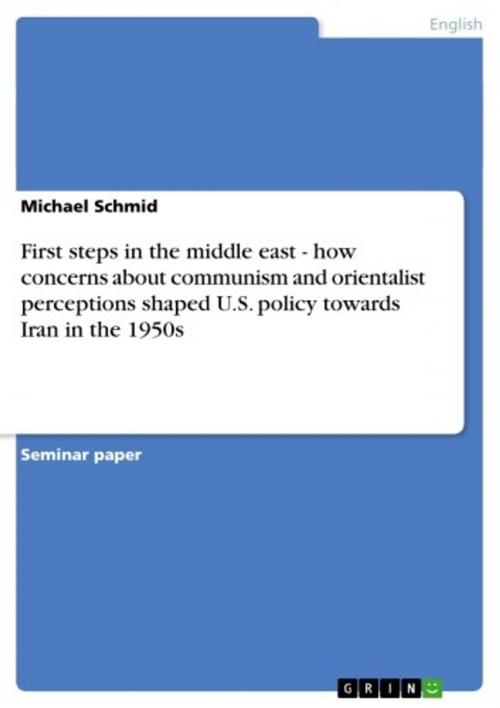First steps in the middle east - how concerns about communism and orientalist perceptions shaped U.S. policy towards Iran in the 1950s
how concerns about communism and orientalist perceptions shaped U.S. policy towards Iran in the 1950s
Nonfiction, Entertainment, Drama, Anthologies| Author: | Michael Schmid | ISBN: | 9783638784078 |
| Publisher: | GRIN Publishing | Publication: | April 28, 2007 |
| Imprint: | GRIN Publishing | Language: | English |
| Author: | Michael Schmid |
| ISBN: | 9783638784078 |
| Publisher: | GRIN Publishing |
| Publication: | April 28, 2007 |
| Imprint: | GRIN Publishing |
| Language: | English |
Seminar paper from the year 2006 in the subject American Studies - Miscellaneous, grade: 1,3, Free University of Berlin (John F. Kennedy Institut), course: Rise to Power: US Foreign Policy in the 20th Century, 24 entries in the bibliography, language: English, abstract: No area seems to be of more importance in the field of foreign policy and diplomatic history today than the so called Middle East. The continuing clashes between Israeli forces and Palestinian suicide bombers, the difficult challenge of stabilizing a newly elected government in Iraq and the growing tension between Iran and the international community concerning the issue of nuclear power are just a few examples which illustrate the urgency to look at origins of these conflicts. As an example for this essay, I have chosen the case of Iran. I will focus on the very beginning of the involvement of the United States in the Middle East, and I will demonstrate what kind of issues and perceptions played an essential role in the determination of U.S. policy towards Iran. Although I do not attempt to find causes for the current situation, some of the factors I will identify in this essay might also serve as an explanation for the current conflict with Iran. Yet, this is not my primary intention and further research and empirical data will be required to investigate connections to the contemporary situation with Iran. However, I will argue that the way US policymakers viewed their Iranian counterparts did not change fundamentally for many decades at least regarding the country of Iran if not more countries in the Middle East. I downplay this aspect because a lot more research is needed to support this argument and it would extend beyond the scope of this essay. Mostly the dealings with Iran and its premier Muhammad Musaddiq in the early 1950s at the time of the Anglo-Iranian oil crises will be of relevance. The essence of my argument is that even though strategic thinking and the fear of a communist takeover of Iran played a role in negotiating with Iran, the reason why Musaddiq was toppled by the CIA and the British MI-6 was because Western diplomats had a so called 'orientalist' mindset and perceived him as too weak and irrational as to fight off Soviet attacks and propaganda which could have led to an eventual takeover of Iran by Soviet forces. In order to pre-empt that, the United States and Britain collaborated to bring down Musaddiq and install a shah regime that would, on the one hand be more favourable to Western oil interests, and on the other hand more resistant regarding possible Soviet invasion efforts.
Seminar paper from the year 2006 in the subject American Studies - Miscellaneous, grade: 1,3, Free University of Berlin (John F. Kennedy Institut), course: Rise to Power: US Foreign Policy in the 20th Century, 24 entries in the bibliography, language: English, abstract: No area seems to be of more importance in the field of foreign policy and diplomatic history today than the so called Middle East. The continuing clashes between Israeli forces and Palestinian suicide bombers, the difficult challenge of stabilizing a newly elected government in Iraq and the growing tension between Iran and the international community concerning the issue of nuclear power are just a few examples which illustrate the urgency to look at origins of these conflicts. As an example for this essay, I have chosen the case of Iran. I will focus on the very beginning of the involvement of the United States in the Middle East, and I will demonstrate what kind of issues and perceptions played an essential role in the determination of U.S. policy towards Iran. Although I do not attempt to find causes for the current situation, some of the factors I will identify in this essay might also serve as an explanation for the current conflict with Iran. Yet, this is not my primary intention and further research and empirical data will be required to investigate connections to the contemporary situation with Iran. However, I will argue that the way US policymakers viewed their Iranian counterparts did not change fundamentally for many decades at least regarding the country of Iran if not more countries in the Middle East. I downplay this aspect because a lot more research is needed to support this argument and it would extend beyond the scope of this essay. Mostly the dealings with Iran and its premier Muhammad Musaddiq in the early 1950s at the time of the Anglo-Iranian oil crises will be of relevance. The essence of my argument is that even though strategic thinking and the fear of a communist takeover of Iran played a role in negotiating with Iran, the reason why Musaddiq was toppled by the CIA and the British MI-6 was because Western diplomats had a so called 'orientalist' mindset and perceived him as too weak and irrational as to fight off Soviet attacks and propaganda which could have led to an eventual takeover of Iran by Soviet forces. In order to pre-empt that, the United States and Britain collaborated to bring down Musaddiq and install a shah regime that would, on the one hand be more favourable to Western oil interests, and on the other hand more resistant regarding possible Soviet invasion efforts.















